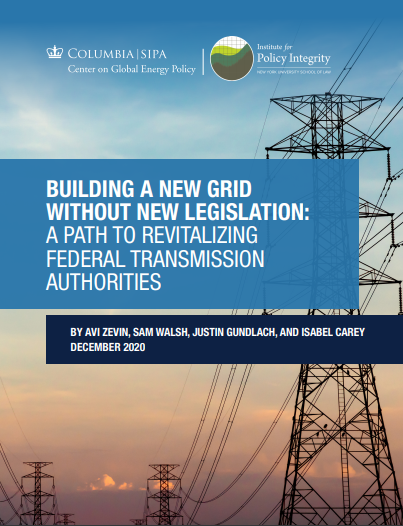-
Comments on OCC’s Fair Access Financial Services Rule
The Office of the Comptroller of the Currency (OCC) proposed a rule that would preclude banks from taking climate risks into account when making decisions regarding the provision of financial services. We submitted joint comments explaining how OCC fails to consider or justify serious costs imposed by the rule. Climate risks pose a significant threat to the economic and operational health of firms in the energy sector and to the stability of the financial system as a whole.
-
Comments to HHS on Affordable Care Act Proposal
The Department of Health and Human Services (HHS) proposed Patient Protection and Affordable Care Act benefit and payment parameters for the 2022 coverage year that could cause significant health costs. We submitted comments on several elements of the proposed rule, including (1) its authorization of entirely privatized insurance marketplaces; (2) its promotion of the use of private enrollment websites by enrollment assisters; (3) its reduction of marketplace user fees; and (4) its continued reliance on a 2019 change to the formulas used to calculate premium-adjustment percentages and cost-sharing limits for consumers.
-
Amicus Briefs on Navigable Waters Protection Rule
In April, the Environmental Protection Agency (EPA) and Army Corps of Engineers published the Navigable Waters Protection Rule, which considerably restricts the waters and wetlands that are federally protected under the Clean Water Act. We filed briefs in the Northern District of California and District of South Carolina focusing on the agencies’ economic analysis, which the agencies use to obscure the rule’s anticipated harms. We later filed in the Tenth Circuit Court of Appeals, the Northern District of New York, the District of Massachusetts, and the District of Maryland.
-
Comments to EPA on Cross-State Air Pollution Rule
Our comments on the Revised Cross-State Air Pollution Rule Update for the 2008 Ozone NAAQS identify critical flaws in the proposal's design and regulatory impact analysis. The Environmental Protection Agency's (EPA) unreasonably low valuation of climate effects also contributes to its selection of an inefficient policy alternative. We submitted joint comments detailing how EPA's flawed analysis harms public health and the environment.
-
Building a New Grid Without New Legislation
A Path to Revitalizing Federal Transmission Authorities
In the absence of legislation, critical long-distance transmission can be developed by applying existing federal legal authorities. A number of important regulatory and commercial measures have been proposed, including streamlining transmission planning, upgrading existing transmission system components, putting transmission lines underground, and using existing rights-of-way from highways and railroads. Even if these solutions are adopted, however, state siting requirements may prove an important obstacle to developing an efficient, national transmission grid. So, this paper examines legal authorities already available to the Department of Energy and the Federal Energy Regulatory Commission to develop the interstate transmission capacity crucial to the energy transition.
-
Amicus Brief in D.C. Circuit on Methane Limits for Oil and Gas Sector
The Environmental Protection Agency (EPA) recently finalized revisions to New Source Performance Standards for methane and volatile organic compound (VOC) emissions from the oil and natural gas sector. We filed an amicus brief in the U.S. Court of Appeals for the D.C. Circuit, focusing on EPA's flawed legal and economic justifications for the rule.
-
Comments on HHS’s Sunset Rule
The Department of Health and Human Services (HHS) has proposed to retrospectively and prospectively establish an "expiration date" for each of its regulations. Under the proposed rule, regulations would be automatically rescinded unless HHS first completes a restrospective review of the regulation's effects on small entities pursuant to the Regulatory Flexibility Act. We submitted comments criticizing the proposal, which is neither lawful nor rational.
-
Report Series: the Flawed Analysis Underlying the Rollback of the Clean Car Standards
The Environmental Protection Agency and National Highway Traffic Safety Administration used several gimmicks and faulty assumptions to skew the analysis of the rollback rule, obscuring just how harmful it is to the American public. We published a series of reports examining several of the flaws.
-
Ninth Circuit Affirms Injunctions of Public Charge Rule
The U.S. Court of Appeals for the Ninth Circuit ruled that the Department of Homeland Security’s “Public Charge” rule is both contrary to statute and arbitrary and capricious. Our amicus brief in the case played a key role in shaping the decision. The Ninth Circuit adopts our core arguments, emphasizing how Homeland Security fails to assess the rule's harms and draws conclusions that are contradicted by the record.
-
Comments and Reply Comments on FERC’s Carbon Pricing Policy Statement
The Federal Energy Regulatory Commission proposed a policy statement on carbon pricing in organized wholesale electricity markets. We submitted comments encouraging FERC to strengthen its proposal by making specific clarifications. We later submitted reply comments addressing points made by other commenters and providing further guidance on how FERC can improve its final policy statement.







